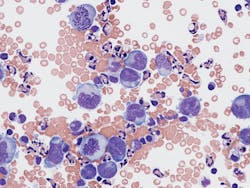A team of researchers led by Dr. Frederick L. Locke, chair of the Blood and Marrow Transplant and Cellular Immunotherapy Department at Moffitt Cancer Center, analyzed tumor gene expression patterns from patient samples and determined that a B-cell gene expression signature and CD19 protein expression were significantly associated with improved event-free survival for patients treated with axi-cel but not standard therapy.
Patients with lower tumor cell levels of CD19 had gene expression patterns associated with immune suppression. These observations suggest that the tumor immune environment may play an important role in regulating axi-cel therapy and outcomes. In addition, biomarkers associated with improved outcomes to axi-cel therapy decreased as patients had more treatments, suggesting that receipt of axi-cel in earlier lines of treatment is essential to ensure better patient outcomes.
Within the standard therapy group, the researchers discovered that patients who had a high tumor burden or elevated levels of the enzyme lactate dehydrogenase had shorter event-free survival. Additionally, patients with a nongerminal center B cell-like molecular subtype of large B-cell lymphoma had poorer outcomes with standard therapy. In contrast, molecular subtypes were not associated with axi-cel outcomes, suggesting axi-cel may overcome some mechanisms of resistance to standard therapy.

